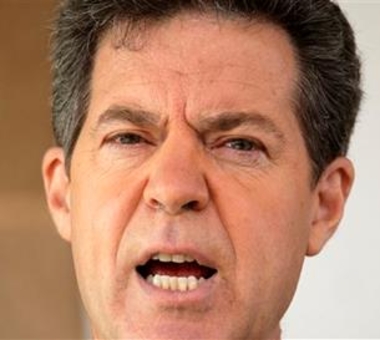Budget shortfall, World Series among Kansas' top 2015 news

Topeka, Kan. (AP) — A budget shortfall that forced lawmakers to increase sales and cigarette taxes and a long-awaited World Series title were among the top stories in Kansas in 2015.
Here's a look at those and the rest of the year's Top 10 stories:
Budget shortfall: Lawmakers hiked sales and cigarette taxes after state revenues fell short of expectations for much of the year, but the state still faces a projected $160 million budget deficit for the fiscal year that begins July 1, 2016. And the state's budget problems could get worse because of a lawsuit filed by four school districts challenging the state's funding for K-12 schools. The Kansas Supreme Court is considering a lower-court ruling that ordered the state to boost funding by at least $548 million a year to meet its constitutional obligation to provide a suitable education to every child.
Kansas City Royals-World Series: The Kansas City Royals bested the New York Mets in Game 5 for their first World Series championship title since 1985. Royals Manager Ned Yost gushed after the win: "From Day One, there was no doubt in my mind that they wouldn't accomplish it."
Gay rights: Kansas began extending rights to gay couples after a series of court rulings, including making it easier for them to obtain birth certificates for children conceived by artificial insemination. Meanwhile, the Kansas Department for Children and Families faced allegations that it discriminated against gay and lesbian foster parents who want to adopt the children in their care.
Jewish site shootings: An avowed anti-Semite was sentenced to death for the fatal shootings of three people at Jewish sites in suburban Kansas City. Frazier Glenn Miller Jr., who was convicted of capital murder and several other charges for the April 2014 shootings, said he wanted to kill Jewish people before he died; none of the victims was Jewish. During the sentencing hearing, Johnson County District Judge Thomas Kelly Ryan said: "Your attempt to bring hate this this community, to bring terror to this community, has failed. You have failed, Mr. Miller."
Judicial funding-Kansas: The Kansas Supreme Court in December unanimously struck down a law meant to reduce its administrative influence over lower courts, setting up a showdown with lawmakers who threatened to defund the state's entire judiciary system if the law was overturned. The justices wrote that the potential loss of funding did not factor into their ruling.
Election fraud investigation: Kansas' GOP-dominated Legislature granted Secretary of State Kris Kobach, the state's top elections official, the power to prosecute alleged voting irregularities himself. Kobach described the move as "an important innovation," and his office filed three criminal cases in two counties. The American Civil Liberties Union raised concerns that Kobach has an incentive to file criminal cases to validate his assertions that election fraud is a problem.
Terrorism: Threats of violence roiled the state, with a Topeka man charged with a Fort Riley bomb plot, and a Wichita man sentenced to 20 years in prison for plotting a suicide bomb attack at a Wichita airport. A deadly attack in Paris prompted Gov. Sam Brownback to issue an executive order attempting to halt the relocation of Syrian refugees to Kansas. Meanwhile, Kansas elected leaders sought to prevent the state from becoming the next home to detainees currently housed at Guantanamo Bay, Cuba.
Abortion: Kansas' first-in-the-nation ban on a common second-trimester method for terminating pregnancies was set to take effect in July. But a judge blocked the law while a lawsuit challenging it proceeds.
University of Kansas-student protests: A forum at the University of Kansas on race issues and discrimination brought the frustrations of some students with administrators and student leaders to the surface. A student group, Rock Chalk Invisible Hawk, made more than a dozen demands, including greater faculty diversity and mandatory "inclusion and belonging" training for all students and staff. They also want the university to continue banning concealed weapons on campus, though under state law, beginning in July 2017, public universities must allow them in buildings that don't have security measures.
Death sentence upheld: The Kansas Supreme Court upheld a death sentence — for the first time since the state reinstated capital punishment in 1994 — in the case of a serial killer who trolled for victims online. "My expectation is that, as we move forward, these cases will move at a faster pace," Johnson County District Attorney Steve Howe said after the ruling, adding that the decision marked a shift in how the court handles death penalty cases.
Copyright 2015 The Associated Press. All rights reserved. This material may not be published, broadcast, rewritten or redistributed.
The Gayly – December 29, 2015 @ 7:10 a.m.





